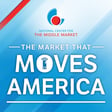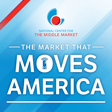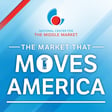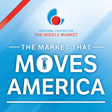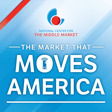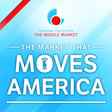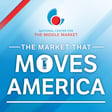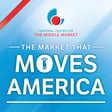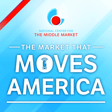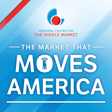Introduction and Focus Areas for Middle Market Companies
00:00:01
Speaker
Like any successful business, middle market companies must focus intensely on their customers. But how do they do that in the face of challenges like talent, technology, and trade?
00:00:13
Speaker
In this episode of The Market That Moves America, we speak with the chief marketing officer from Blue Mercury to hear how she deals with these challenges as well as address other opportunities for her company and others in the middle market.
00:00:28
Speaker
Welcome to the Market that Moves America, a podcast from the National Center for the Middle Market. The center is the leading source of knowledge, leadership and innovative research on the middle market economy. Throughout our podcast, we will feature middle market leaders and stakeholders to hear their real world perspectives on trends and emerging issues.
00:00:50
Speaker
Welcome to the market that moves
Guest Introduction: Minhee Su, CMO of Blue Mercury
00:00:52
Speaker
America. My name is Doug Farron, Managing Director of the National Center for the Middle Market, located at The Ohio State University Fisher College of Business. We are very excited about today's episode because not only do we have a middle market executive joining us. We also have a Fisher College of Business alum joining us. So today I'm going to be talking with Minhee Su from Blue Mercury.
00:01:18
Speaker
Minhee, we're glad to have you on the podcast. Yeah, very happy to join, Doug. So we had a chance to meet each other recently at a Fisher College alumni event in New York City. it was a great discussion that we had there. So I'm thrilled that you were able to join us ah to kind of repeat that, so to speak.
Minhee Su's Background and Blue Mercury's Growth
00:01:39
Speaker
But before we get into the conversation about some middle market topics, can you tell us a little bit about your background and then what you're currently doing with at Blue Mercury?
00:01:49
Speaker
Right. I'm very happy to. So my name is Mingyi. I'm currently head of marketing for Boomer Kree. So I lead PR, creative, social media, performance, marketing, and brand marketing, basically everything related to marketing.
00:02:05
Speaker
um I am not a traditional marketer. I have a very diverse background. Actually, my love for consumers and retail started at a young age of 14 when I worked at my mom's um retail store selling fashion accessories and um ah toys and et cetera in China.
00:02:25
Speaker
And always have a passion for having a closer connection to the consumer. I came to the US. I first studied accounting at the Fisher College of Business at Ohio State.
00:02:36
Speaker
That launched my career into a way that I couldn't even imagine what opportunities it opened up. So I started more in finance and accounting in New York City at Ernst & Young, and then went into strategy strategyy consulting ah McKinsey.
00:02:54
Speaker
ah have an MBA from University of Chicago. So more of a mix of finance business and now more marketing focused background. Awesome. And tell us a little bit about Blue Mercury just for listeners who may not have heard about the company. Tell us a little bit about your products and and markets and and things of that nature.
00:03:15
Speaker
Of course. Boomer Creek actually has been around for about 26 years. And it started as ah like a mom and pop company, that neighborhood luxury beauty store, bringing the luxury skincare products to the consumers where they are.
00:03:33
Speaker
um And with a 26 years history, the company has grown into an army company. leaders in the premium skincare and beauty space. It has about 175 stores across the country.
00:03:48
Speaker
We carry mostly different higher price point products um that has high like performance and results for the consumer. um For those who don't know, Blue Mercury is actually owned by Macy's Inc.
00:04:03
Speaker
So it's the in the Macy's Inc. family, but we remain that kind of middle-sized, small business um agility and flexibility.
00:04:15
Speaker
And well ah in your time at the company, what are some of the kind of key influences or factors that you've seen that have driven the growth of Blue Mercury?
Consumer Demand and Digital Transformation
00:04:26
Speaker
Has it been things like expanding into new markets or innovating new products? Like what are some of the broad categories that drive business growth?
00:04:35
Speaker
ah Very good questions. I always go back to the consumer. So I think the factors that are driving business growth are really related to the consumer behavior.
00:04:47
Speaker
um Number one factor is definitely about the expansion. But the expansion of footprint is driven by the stronger desires and growth of the consumer space for desiring a higher result, higher efficacy, premium performance.
00:05:03
Speaker
beauty products. And we've seen that overall demand has grown in the last probably 20 years or so in the US and globally. So the footprint growth is driven by that demand growth.
00:05:15
Speaker
The second thing is um is the innovation in the beauty space as well. So the in the assortments and availability of products, if we look at the companies, even just five years ago or 10 years ago, we have significantly changed the assortments to be increasingly relevant to what the consumer wants.
00:05:35
Speaker
um Starting with more skincare base, now the consumers are venturing across a total beauty care regimen. So the products that we carry in our door, looking at from that lens, from skincare, makeup, hair care, fragrance, and home fragrances.
00:05:53
Speaker
So we are growing in that lens of being more sophisticated in all category related to beauty. And that's how the consumers are thinking about their total beauty consumption. The last um piece of the growth I do think is um driven by COVID and these external factors that accelerate a company.
00:06:12
Speaker
um The company was very brick and mortar in histories. And since this is a neighborhood store, everyone kind of know their neighborhood manager, love to pass by as you walk your dog or drop off your kids. And then you just want a little...
00:06:27
Speaker
moments of um ah you know feeling better about yourself or finding your next regimen. ah Since COVID, the role of digital has changed that is no longer just about fulfillment, but digital has become more of a discovery channel as well as a acquisition channel for the company.
00:06:47
Speaker
So those are the three things I would say is consumer demand, innovation in the industry, as well as like the pandemic really accelerated changes.
The Role of Brick-and-Mortar Stores and Technology
00:06:55
Speaker
Yeah. Would you say that the brick and mortar stores, though, are still very important for the company?
00:07:00
Speaker
Because I talk to a lot of people and I'm surprised. They're like, hey, yeah, I know Blue Mercury. That's in my neighborhood. i want To your point, they walk by it every day or they see it or stop in. So to me, that's almost like like ah even though digital may be an increasing part of the business, the brick and mortar still has a large role. Would you agree with that?
00:07:19
Speaker
Absolutely. um The brick and mortar, the reason that is so important, well, one is the history of the company being that bringing the the luxury to the neighborhood.
00:07:32
Speaker
The other is the human connections that brick and mortar deliver. um ah A pure digital experience cannot deliver. Given we're in a more premium segment of the consumer, that human connection, at the exclusivity, the experiential,
00:07:49
Speaker
um ah journey is what differentiate us from a lot of competitors that they can not get elsewhere. Beauty is still a very sensorial category. You want all senses to come to life, the scent, the texture, the color, um and all those elements really play into the decision making.
00:08:10
Speaker
So the company took good care of how that brick and mortar would aid that consumers in finding their beauty regimens and products they cannot live without.
00:08:22
Speaker
and That makes a ton of sense. So let's um dive into some of these topics that the center has been following that are are particularly important to middle market companies. And you mentioned one already, and that's where i want to start, which is around technology.
00:08:37
Speaker
And so you you have a very interesting background with public accounting, consulting, now ah marketing at a middle market company. yeah in In your career, how have you seen technology maybe influencing how a company makes decisions or how you operate? Or you know what what are some examples of that that you might be able to share?
00:09:00
Speaker
Right. um Technology is extremely important in decision making, mainly because it provides, I think there are two things. One is it provides a trustworthy, reliable information for you to analyze decisions, as well as predicting where you should place your bet.
00:09:22
Speaker
So it rather than just ah relying on experiences and gut feeling, technology enabled that more neutral, less biased way in looking at where the business goes and increase our chances to win in the market.
00:09:38
Speaker
Secondly, is technology allows us to scale. um the you know The examples that I would give is everywhere I go, it's almost a transformation in technology. And it's very exciting to see.
00:09:51
Speaker
You will see technology being used. For example, when I was S&L companies, um looking at how we can optimize supply chain and ah improve our forecasting and reduce inventory so that we can reduce inventory write-off.
00:10:08
Speaker
So there's a whole technology reforms in the companies in supply chain data and procurement, etc. all into house. ah one house um Obviously, at Blue Mercury, this is also extremely important when we're going into AMI, technology allows us to scale.
00:10:26
Speaker
So with the digital transformation, we need a better CRM. We need better management of our platforms. We need to ensure that we're minimizing risk technology.
00:10:40
Speaker
fraudulence activities, as well as having a good foundation to scale while to handle the amount of messages or emails or creative assets that we make. So it's also a foundation to scale growth.
00:10:57
Speaker
um This is, you know, the form of performance wise, I've seen technology used in it's it's a very integral part of the business. You can't do anything without thinking technology first and how that is integral into part of the decision making, transparency, risk management um and your um profit and loss optimization.
00:11:21
Speaker
Yeah, sure. And the probably the most talked about technology right now, of course, is ai Yeah. So is is Blue Mercury currently utilizing AI in either the marketing functions or other parts of the business?
00:11:33
Speaker
Yes, um we are you because we're very small, I would say we're not at a scale of, hey, implementing AI in everywhere. So this is...
00:11:46
Speaker
First of all, every employee is probably using AI in a certain way to improve their efficiency. I've seen like a people using AI to better structure their narratives and storytelling.
00:12:01
Speaker
I've seen we using AI to improve our messaging, to be sharper. us using AI to conduct consumer research. So it is in every piece of the the roles and functions um in a more organic way already.
00:12:17
Speaker
I would say in a less organic way, how we're considering using AI is going back to the root of how we differentiate from competitors is about the human connection. So how do we use AI to enhance that human connection is where we are focusing the AI conversation.
00:12:34
Speaker
Because AI can be applied in everywhere. And I lead marketing. Obviously, I'm biased into that assisting the customer love and loyalty. So the tools that I am considering right now are, can I get tools that can really help me enhance um social engagement, training an AI voice for us to reach to high-reach influencers and content creators.
00:12:58
Speaker
Can I use AI at scale to ensure I can do better targeting and messaging to my email and CRM journeys? um Can I use AI in customer service so that ah we're able to provide better recommendations and um and improve that connection with the customer?
00:13:18
Speaker
So every angle is that I'm looking at AI at BoomerCree is through that lens of how does it enhance our offerings and human connections. Yeah. So click clearly technology is important that companies of all sizes, middle market, including Blue Mercury, of course, but you still need people and
Challenges in Talent Retention and Trade Policy
00:13:38
Speaker
talent. So let's kind of shift to that topic. You know, we've been we've seen over the last, gosh, almost 10 years now, middle market companies tell us that oftentimes yeah attracting, retaining and developing good talent can be a challenge. Are those anything that you experience at Blue Mercury?
00:13:58
Speaker
Yes, absolutely. We experienced that challenge as well. I think as a smaller company, um the growth cycle is not linear at times. So you could have a great year and then you could have a less of a great year, given, you know, as you're smaller, you're probably more prone to economic cycle.
00:14:20
Speaker
ah What we have to think about talent is not just the ups and down with the economic cycle, but a little bit longer term. Where can they grow? What can we incentivize them with?
00:14:32
Speaker
I find it really challenging in finding more room to grow when there is economic downturn. So how do I think about that talent if there is not a official promotions like really near term for them? Because usually in a bigger company, you probably can open up different places and pockets from a growth perspective for amazing and star talent. So that's ah the a key part of how do I retain them without having more of the upward mobility in the short term. To your point of finding and attracting talents.
00:15:11
Speaker
ah is the compensation. What is the calm upside financially and non-financially that Boomercury can provide to the talent? And this is something that as a resource-strapped company, when you're small, you want it to be very efficient with every dollars that you spend.
00:15:31
Speaker
um Talent is extremely important. So how do we stand out in the marketplace to attract those to come with both levers is ah is a key challenge as well. So um what are ah some of the ways that you think about training and development for your for your workforce?
00:15:50
Speaker
Is it something that's like, are you sending people out to formal classes and training or is it more informal kind of experiential on the job? That's a question we get a lot is, you know, middle market companies may be struggling if if they need to develop people or they need to create new skill sets, how do they go about doing that? or Do you have any examples?
00:16:09
Speaker
Yeah, I find great examples of encouraging the team to be more outward, I would say like more open to experiences and learnings outside of Blue Mercury as well.
00:16:24
Speaker
um The beauty of being a mid-sized company is that you actually have quite a bigger of scope than what you would do in a larger company. You would, ah in a larger company, specifically focus on one work stream while at a middle company, a smaller size company, you're overseeing multiple different things at the same time.
00:16:44
Speaker
That gives yeah that the the talent an opportunity to be representing the company in a bigger way. So what I mean is that there are a lot of conferences that ah right now, like different industries would host.
00:17:00
Speaker
um And I encourage my team to take advantage of those conferences. conferences or trade shows or um outside experiences that would give them more information and data point in how the market is changing and be more sensitive to that and upfront to those innovation.
00:17:20
Speaker
I think in a bigger company, it's to is more difficult to do because you don't oversee bigger pieces. But now you're in a mid-sized company, not only you're only overseeing email emails, you might be overseeing multiple channels together. So I encourage my team that own the bigger scope to then, what are the new tools out there that can um you know improve? I'm using marketing as as an example, improve digital marketing.
00:17:49
Speaker
What are the um you know ah exciting like social engagement agencies out there? And what are they doing? So these are the very great learnings that the team bring back to the table and insert innovation. And that makes them very motivated as well because they now can represent our company and then be engaging in these conversations.
00:18:15
Speaker
Yeah, great. so So the last topic I wanted to touch on, and and you kind of mentioned this earlier, was around kind of trade and and supply chain. And COVID clearly had a big impact, as you mentioned a little bit earlier, on some opening up you know different focus and priority on the digital channel.
00:18:35
Speaker
Yeah. Now that we have this kind of you know the trade policy keeps changing and things like that, what what are you seeing and how has that impacted your company in terms of how you've had to maybe make changes in your supply chain or or think a little bit differently?
00:18:51
Speaker
Yeah, so with the trade um policies changing, we see two things. Externally, our brands, given our retailers, so we sell beauty brands' products, so not just our own products, the brands are more cautious with their cash. So everybody try to preserve as much cash as possible to be ready um to deal with any uncertainties or imprecations.
00:19:18
Speaker
pri capability So we see that a little bit more cautious in spending, especially in marketing. um We also see that brands are starting to bake into some price increase assumptions, also including ourselves. Like what does that mean to scenario plan if we will have to upsell a certain cost?
00:19:39
Speaker
how what part of that the company should absorb and what part of that ah can be passed through. So those are the scenario planning that ah we see. The second thing that we see is a more rigorous um approach in managing inventory.
00:19:57
Speaker
So how do we get to a better inventory management system and or process to reduce more write-offs in inventory and increase our inventory turnover?
00:20:08
Speaker
These are very important levers to pull where um you know the macroeconomics on trade policies can impact the supply chain from a cash flow perspective and inventory perspective. So we are seeing...
00:20:23
Speaker
more thoughtfulness in this. But overall, we do not see that passing to the consumers yet. I think every company is still trying to figure out how do we do this with the least disruption to our top line, which means the least disruption to the consumer.
00:20:43
Speaker
Right. um So the last thing I kind of wanted to ask was, what are some other big trends that you might see developing over the next, say, one to two years that may impact you know your role or company specifically or just even for the broader middle market outside of the technology, trade and talent that we've talked about today?
00:21:05
Speaker
Are there other things that you see as being big issues or factors?
The Future of Workforce Dynamics
00:21:10
Speaker
um I do think that the AI will continue be more and more important. So I know we already talked about that, but the transformation is only in the beginning.
00:21:24
Speaker
I think that what we will see in the 12 to 24 months is completely changing. how companies think about workforce. I'm seeing more about the staffing model of freelance plus AI into a um more speed and agility.
00:21:43
Speaker
And I'm seeing that in mid-sized company more as we think about talent. And this changed how talent thinking about their own journey as well. So but versus like, hey, I'm going to stay in a company forever. Can I look at myself as a small company as well, having different clients and freelancing on a topic I'm extremely good at and helping client to scale?
00:22:05
Speaker
So definitely seeing the movement of the staffing model changing for many companies to be more agile. The other thing that I think is really interesting in seeing is the diversification of ah innovation. So um I really see that this is a great opportunity for midsize and small size company to start innovation.
00:22:32
Speaker
at the center of innovation and bringing different ideas to the consumer. I keep telling people because I'm in retail, I keep referencing the success of Popmart, um how you use blind boxes or try different low risk experiments embedding into a high returned outcome.
00:22:54
Speaker
So this experimental innovation is what we are seeing in the market. And we'll continue to see more of that for companies to adapt to this new changing consumer preference and also the macro environment changes with AI and global trade.
00:23:11
Speaker
Yeah, those are those are great great insights. And to your point, middle market companies are at the perfect sweet spot to be able to make those type of small experiments and then rapidly you know shift direction based on the result, much more so than a small large company. Yeah.
00:23:30
Speaker
Yes. um Yes. Mindy, this has been a wonderful conversation. I greatly appreciate your time and and all of the insights that you've provided today. And again, just want to thank you for for being on our podcast.
00:23:44
Speaker
Yeah, of course, Doc. And I'm very excited to be on here and share my experience with everyone today. and Always have a great moment connecting with Fisher again. Wonderful. Thank you.
00:23:56
Speaker
Well, thanks, everybody, for joining us. And we will talk to you next time. Thank you for listening to The Market That Moves America. Never miss a new episode by subscribing anywhere podcasts can be found.
00:24:07
Speaker
You can also subscribe to our email newsletter at middlemarketcenter.org.

